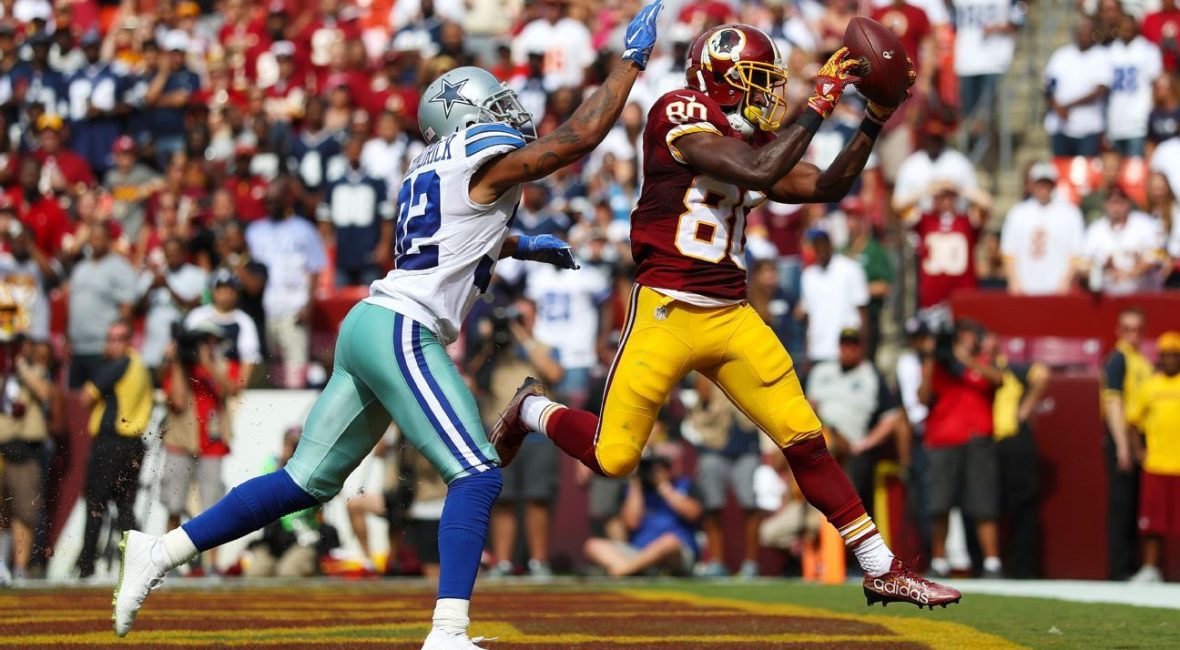ASHBURN, Virginia — It wasn’t just the quickness that stood out to Washington Redskins quarterback Alex Smith. Nor was it just the way Jamison Crowder caught the ball. Or the routes he ran.
Rather, it was everything. And in one spring, Smith already seemed to develop a trust in his slot receiver. The Redskins have other targets who pleased Smith — and he still hasn’t worked with tight end Jordan Reed. That won’t happen until some point in training camp as Reed recovers from toe surgeries.
But Crowder is the most proven of the wide receivers, with three consecutive 60-plus catch seasons as he enters his fourth year. There’s a reason Smith smiles when asked about Crowder, a guy he clearly clicked with this spring.
“Super talented,” Smith said. “Such great feel. Such great instincts. Such great vision.”
It’s a mutual admiration, too.
“He knows the game, he knows how to see defenses, see different coverages,” Crowder said. “By him having that experience, he knows how to put the ball in the right place. … You can already see that we can do a lot of great things as a unit.”
Their skills should mesh quite well once the season begins. Crowder has been productive in his first three seasons, with 192 combined receptions and 12 touchdowns.
His best season in the slot was his second year in 2016 when he averaged 13.43 yards per catch — and had seven touchdowns — when aligned in this area, according to ESPN Stats & Information. Only four players with at least 30 receptions from the slot had a better yards per catch that season.
That season, it was quarterback Kirk Cousins’ second year starting, and the Redskins also had proven veterans such as Pierre Garcon and DeSean Jackson outside. That combination freed Crowder. Also, it allowed for different routes, as the average air yards per target on these throws to Crowder was a career-high 8.29.
Another fact worth noting: In the past five years, Smith owns a combined 102.8 quarterback rating when targeting slot receivers. That’s third best in the NFL over that time for quarterbacks who have made at least 30 starts, trailing only Aaron Rodgers and Russell Wilson. Smith owns the ninth-most completions to slot receivers in that period.
The Redskins hope more of the same follows this season. They have a quarterback patient enough to move the ball underneath in Smith, if that’s what the defense allows.
And it was evident this spring how Crowder can be effective with this offense. The Redskins could clear out areas by aligning him on the same side with Josh Doctson and Paul Richardson, both of whom can make plays down the field. That enables Crowder to work underneath; he’s adept at finding soft spots in zones and has the quickness to better shake man coverage by running across the field to a vacated area.
“That will help out a lot,” Crowder said. “It’s similar to when DJax was here. Paul has that ability to go over the top and the defense has to back up and they have to honor that, and then when [Reed] is back healthy, he’ll definitely open it up for me and other guys as well.”
But what Smith likes can be boiled down to one word: trust.
“He’s so easy to read as a quarterback,” Smith said. “Such great body control, body language. He sees defenses well and it’s hardest to do that in between the hashes. You get so many looks and leverages and you have to handle all those things. He’s decisive and he’s so friendly. He’s always coming back to the ball, always working for you. Those are things you know as a quarterback come crunch time that here’s a guy who will constantly work his tail off to get open. He wants the ball. You love that as a quarterback.”
Crowder’s contract expires after the season, making this a pivotal one for him. But he’s also coming off a year in which he was plagued by hamstring issues. To help, he returned to Duke University this offseason and worked out the way he had when he played for the Blue Devils. He said he focused on his entire body, but he also did more power cleans and hang cleans.
“When I was at Duke, I didn’t have hamstring issues, maybe one or two, so I went back and did more dynamic lifts that I did in college,” he said. “I feel great now … It was frustrating [last year]. When you go out there with a lingering injury, you’re already setting yourself behind.”
“He always gets better because he wants to be a great player,” tight end Vernon Davis said. “He’s a dangerous player. He’s quick, he’s elusive. He can do it all — he can run, catch. He’s one of those players you want on your team.”



